As soon as Japan's Prime Minister Kishida announced on July 14 that he would hold the state funeral of former Prime Minister Abe, there was fierce opposition. However, eight days later, the Japanese government decided that the state funeral would be held at the Nippon Budokan on September 27. Opinion polls show that "opposition" accounts for the majority, and the Cabinet approval rating plummeted, but Kishida stubbornly closed the objection and is ready to wait for the wind to stop. This "no question asked " stance is reminiscent of the Abe administration's permission to exercise collective self-defense and the forced breakthrough over the new security legislation from 2014 to the following year, as instructed in the Third Armitage Report (2012). The core of the successive US administrations' security policy toward Japan after the Cold War was "to let the Japanese Self-Defense Forces enter the collective security system under the command of the US military." In the 1980s, when the friction between Japan and the United States reached its peak, the US side hysterically shouted "elimination of free-riding security" and "Burden-sharing ." The second Abe administration (2012-2020) fulfilled this demand almost 100%. Taking this opportunity, the US administration began to praise Abe. Following the process of Washington's shift from cold treatment to praise, the September state funeral appealed the "greatness" of Abe's security policy both inside and outside the country, and at the same time, created a tight crisis with the visit of Speaker of the House Peroshi to Taiwan. There is growing suspicion that it is a US campaign that strengthens China's cold war posture and calls on each country to "inherit Abe's will."
■ The Gulf War that became the starting point: "Japan, shed blood"
Bill Emmott, the former editor-in-chief of the English magazine "The Economist", speaks for the intention of the US side. Emot said in the Digital Edition of the Mainichi Shimbun on July 24:
"The tragic death of Shinzo Abe has drawn attention to his legacy. There is no doubt that his greatest achievement was diplomatic security policy. Japan's diplomatic stance in 2022 was Abe. It's much clearer and more powerful than it was in 2012 when he returned to prime minister. This fact goes without arguing, although Abe has often left behind.
When I think about how Japan's foreign policy has changed, I remember when I was the director of the Tokyo bureau of the English magazine "The Economist" in the 1980s. At that time, Mr. Abe's father, Mr. Shintaro, was the Foreign Minister under the administration of Yasuhiro Nakasone. ......
In the 1980s, two goals caught the eye of Japanese diplomacy. To manage trade friction well and remain intimate with the United States as an "unsinkable aircraft carrier," as Mr. Nakasone said. And it was all about being modest so as not to offend other countries. Shintaro called it "omnidirectional diplomacy." I talk passively with anyone, but there are few clear and concrete statements ... "
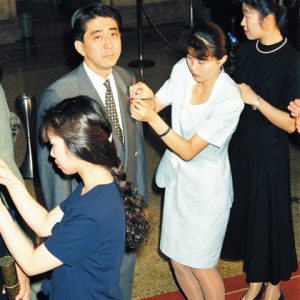 Shintaro Abe passed away in 1989, when the Cold War ended. The Pentagon doctrine, which became a strategy for building a new world order by neoconservatives for US hegemony, was created in 1992. The following year, his son Shinzo Abe entered politics as a third-generation politician = photo =. It took about a quarter of a century for the US conservatives to treat Abe as "a Japanese leader who makes clear, powerful, and concrete statements about diplomacy."
Shintaro Abe passed away in 1989, when the Cold War ended. The Pentagon doctrine, which became a strategy for building a new world order by neoconservatives for US hegemony, was created in 1992. The following year, his son Shinzo Abe entered politics as a third-generation politician = photo =. It took about a quarter of a century for the US conservatives to treat Abe as "a Japanese leader who makes clear, powerful, and concrete statements about diplomacy."
The Japanese government, which was astonished when the United States was asked to dispatch the Self-Defense Forces during the 1991 Gulf War, offered $ 13 billion, which is 30% of the defense budget at that time, but was accused of "shedding blood as well as money." It all starts with. Abe, who launched the second government at the end of 2012, enacted a new security legislation that would allow the Self-Defense Forces to exercise collective self-defense with the U.S. military, and after the war Japan was once again "a nation that can exercise military power abroad and shed blood." ". Washington, which has been bashing Japan since the 1970s to encourage policy changes to Japan, which has become an economic powerhouse but has an exclusive defense-oriented policy, has finally reduced its drinking.
The Gulf War triggered the dispatch of the Self-Defense Forces overseas. However, It has been limited to "activities in non-combat areas that do not shed blood" such as United Nations peacekeeping operations (PKO), minesweeping in the Persian Gulf, logistical support by refueling in the Indian Ocean, and reconstruction assistance in Iraq.
■ Failure of the first administration and education in the United States
It was still halfway to become a Self-Defense Force that "joined the circle of collective defense with the allied forces and shed blood with the US military." The first Abe administration, which was launched in 2006, was involved in the SDF's back-up support activities for the US military and the coalition of the willing forces, which continue to fight in Iraq and Afghanistan, but it is short-lived in less than a year.
The first administration named it "Beautiful Country-building Cabinet" and advocated "breaking out of postwar resume", with constitutional amendment, denial of Tokyo trial, historical revisionism, de facto denial of invasion of Asia, and the issue of military prostitutes. Denied the involvement of the Japanese military, praised the educational language, and promoted the Ministry of Defense to the ministry. The retrospective movement to challenge postwar democracy granted under US occupation was unacceptable to even the neoconservative Bush Conservative government and collapsed, forcing it to reinstate.
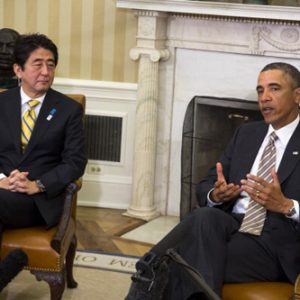 The Obama administration at that time was still wary of the second Abe administration, which re-pitched at the end of 2012, and hated it, and treated Prime Minister Abe thoroughly. Abe consulted for a visit to Washington in early 2013, but was rejected, saying, "Come after visiting Southeast Asian countries that are far from the United States." Although he visited three ASEAN countries and visited the United States in March, the annual joint press conference in the White House garden was omitted, and President Obama was placed at the table where President Obama sat at a formal luncheon. Only one mineral water. An executive of the Japanese Ministry of Foreign Affairs did not hide his shock, saying, "This is the first time for such a strange prime minister to visit the United States."
The Obama administration at that time was still wary of the second Abe administration, which re-pitched at the end of 2012, and hated it, and treated Prime Minister Abe thoroughly. Abe consulted for a visit to Washington in early 2013, but was rejected, saying, "Come after visiting Southeast Asian countries that are far from the United States." Although he visited three ASEAN countries and visited the United States in March, the annual joint press conference in the White House garden was omitted, and President Obama was placed at the table where President Obama sat at a formal luncheon. Only one mineral water. An executive of the Japanese Ministry of Foreign Affairs did not hide his shock, saying, "This is the first time for such a strange prime minister to visit the United States."
Abe, who left the White House in the cold air, rushed to the bipartisan US think tank "Center for Strategic and International Studies (CSIS)", which was said to be the command tower for Japan. There are neo-conservatives Lewis Libby, who was said to have become Abe's "educator" after the collapse of the first administration. And familiar Japan handlers such as Michael Green, Richard Armitage, and Joseph Nye were waiting.
The Center for Strategic and International Studies (CSIS) published the Third Policy Proposal for Japan, Armitage Nai Report in August 2012, just before the inauguration of the second Abe administration. The second Abe administration obediently policies to allow collective self-defense, restart nuclear power plants, promote the Trans-Pacific Partnership (TTP), secret protection law, and abolish the three principles of arms exports, which are included in the third report. And said. Needless to say, it was the permission to exercise the right of collective self-defense. At the beginning of the proposal, the phrase "Does Japan want to stay in a first-class country? If it is a second-class country, this report is not necessary."
In his speech at CSIC, Abe was the first to say "I'm back." He then loosened his mouth and said, "Of course I don't want to be a second-class country." This Abe remark exposed who and what kind of group was in charge of Japan's governing body. Abe, who "returned" to the people who worked hard to bring him back to the post of prime minister, vowed to "realize your recommendations with all his might."
■ Awarding the "Herman Kahn Award"
The US side's strong attitude toward the second Abe administration gradually eased as the administration moved toward allowing collective self-defense.
In July 2013, the Prime Minister's private advisory body / security expert council was held collectively for the second Abe administration to organize and study the relationship between Japan's right of collective self-defense and the Constitution of Japan. There was a big move toward allowing the exercise of the right of self-defense. Chairman Shunji Yanai said, "The government's view so far is too narrow to control things that the Constitution does not prohibit." "Exercise of the right of collective self-defense is permitted by the Constitution. Participation is Japan's responsibility. " Subsequently, in August, the Abe Cabinet appointed a tolerant diplomat as the Director-General of the Cabinet Legislation Bureau, who is in charge of interpreting the Constitution. It was customary for the director-general of the Legal Affairs Bureau to be promoted to the deputy director, and the appointment of foreign bureaucrats was a rush. Abe does not listen to any dissenting opinions and proceeds toward the Cabinet decision to approve the exercise in July 2014.
Under these circumstances, the Hudson Institute, a leading conservative think tank in the United States, awarded the then Prime Minister Abe the "Herman Kahn Award" in the name of the founder of the institute in September 2013. Among the reasons for the award, Abe was praised as "a leader in a transformational period in which Japan is trying to advance the reforms necessary to regain vitality."
According to The Wall Street Journal, the award is given to creative and visionary leaders who have contributed to national security from a conservative standpoint, and Abe was the first non-American to receive the award. Until then, renowned US conservative leaders such as former President Ronald Reagan, former Secretary of State Henry Kissinger, former Secretary of State George Shultz, and former Vice President Dick Cheney have been awarded. The award to Abe was too explicit to see through the political prospectus.
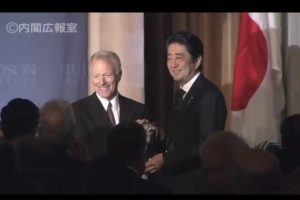 Under the Democratic Party of Japan's administration (2009-2012), Lewis Libby, who was a neoconservative who seems to have had a close relationship with former Prime Minister Abe who became a member of the opposition party and served as former White House Chief of Staff Dick Cheney, was the Hudson Institute Senior Deputy Director at that time. It was none other than this Deputy Director Libby who handed Abe the Trophy at the award ceremony held in New York on September 25, 2013 = photo =.
Under the Democratic Party of Japan's administration (2009-2012), Lewis Libby, who was a neoconservative who seems to have had a close relationship with former Prime Minister Abe who became a member of the opposition party and served as former White House Chief of Staff Dick Cheney, was the Hudson Institute Senior Deputy Director at that time. It was none other than this Deputy Director Libby who handed Abe the Trophy at the award ceremony held in New York on September 25, 2013 = photo =.
At this time, Abe stated his determination to "renovate Japan's security system so that it would not become a weak chain of global security circles built by the United States," and the Cabinet decision to allow collective self-defense the following year and it. He showed unwavering confidence in the enactment of the new security law. It became a de facto pledge to the United States.
After that, the Advisory Panel of Security Experts submitted a report to the Cabinet in May 2014 stating that "exercise of the right of collective self-defense should be permitted." In response to this, the Abe Cabinet approved the exercise in July of the same year with the approval of the Constitution of the Cabinet Legislation Bureau. At the same time, the National Security Council (Japanese version of NSC) was established and the Specified Secret Protection Law was enacted.
With this as a spring, in 2015, the new security bill was forced to pass. It is fresh in my memory that this forced vote has undergone a fierce and large-scale protest since the opposition to the revision of the Security Treaty in 1960. In the House of Representatives, even a constitutional scholar who became a reference for the LDP's recommendation stated that "permitting the exercise of collective self-defense rights is unconstitutional," and the Abe administration passed a bill in both houses of the House of Representatives.
■ Obama's production and encouragement: Visiting the United States as a state guest
In 2015, ahead of parliamentary deliberation on the new security bill, the Obama administration at that time changed its attitude toward Prime Minister Abe 180 degrees. At the end of April, he invited Abe to the United States as a state guest. In Washington, the above-mentioned cold treatment in 2013 was incredibly changed, and Abe's acclaim awaited.
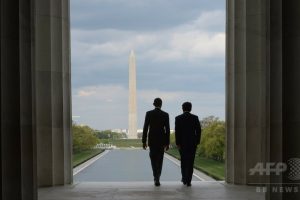 The visit to the United States was a truly amazing surprise. First of all, President Obama, who has been devoted to business-like relationships, himself guided Prime Minister Abe to the Lincoln Memorial = photo =. At supper parties and joint press conferences, he cites a passage in haiku and speaks Japanese in rapid succession, producing surprises one after another. Above all, he expressed in one word "Otagaino Tameni" that Abe's invitation was aimed at "strengthening the alliance." He also sent "Chikai Uchini" on Twitter to conclude. Abe was messaged to meet again at the G7 Summit in Germany the following June.
The visit to the United States was a truly amazing surprise. First of all, President Obama, who has been devoted to business-like relationships, himself guided Prime Minister Abe to the Lincoln Memorial = photo =. At supper parties and joint press conferences, he cites a passage in haiku and speaks Japanese in rapid succession, producing surprises one after another. Above all, he expressed in one word "Otagaino Tameni" that Abe's invitation was aimed at "strengthening the alliance." He also sent "Chikai Uchini" on Twitter to conclude. Abe was messaged to meet again at the G7 Summit in Germany the following June.
The biggest show was the first speech by the Japanese Prime Minister invited to a joint session of the United States Congress and the House of Representatives. The highlight of Abe's speech, entitled "Alliance of Hope," was "The cooperation between the Self-Defense Forces and the US military will be strengthened, and the Japan-US alliance will become even stronger. This is the first major reform after the war. I will do it by coming this summer . " Parliamentarians responded to the speech with standing ovations many times, raising the mood that the speech would set a break in post-WWII US-Japan relations and make a major shift. It was also a message to the Japanese looking at the images broadcast on TV.
Abe's statement of determination has made Japan and the United States a joint statement that "the former hostile nation has become an immovable ally" and that Japan and the United States are "not defined solely by borders" and "an alliance that has come to have a global range." It complemented the summit meeting. In conjunction with the statement, Japan said, "We have transformed into a country that fights with the United States, which shares the values of freedom and democracy, even if it bleeds in a global range."
"Japan has pledged to stand absolutely on the side of the United States at the current world-historical crossroads," said one commentator.
The new security legislation began in the House of Representatives in late May immediately after returning to Japan, and was voted in July. It was approved by the House of Councilors in September. Abe's determination to "achieve the first major reforms after the war by this summer" in the US Congress was literally carried out.
The United States has never been more welcoming and praising the Japanese prime minister, perhaps because of fear of the dramatic rise in the 1960 anti-security movement and the return of the anti-American mood. For Washington, incorporating the Self-Defense Forces capable of collective defense under the command of the US military was indispensable for maintaining and strengthening US hegemony today when the rising China became a threat. The reason why Abe was invited at the national guest level was to soothe Japanese public opinion as much as possible.
■ The end of the postwar period, Compliment of US magazine
It seems that Obama treated Abe, who visited the United States in March 2013, with a thorough cold treatment and rushed to CSIS. As the right of collective self-defense approaches, Abe will be praised as a great leader in Washington. Abe and his entourage must have been delighted with this cataclysm. In 2016, a year after the enactment of the new security law, Obama was the first US president to visit Hiroshima to memorialize the Atomic bomb victims. Abe then visits Pearl Harbor with Obama to create a reconciliation with the United States.
Japan's ability to collectively defend with allied forces abroad was "the first major reform after the war," as Abe emphasized in his speech to the US Congress. The pacifism of Japan as the defeated country, came to an end, and the postwar period was over. Abe, who aimed to expand the armed forces and made the Self-Defense Forces a powerful complementary force of the US military and made it possible to operate on a global scale, at the expense of the depleted Japanese economy, is great for the United States.
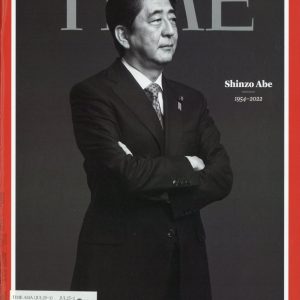 Newsweek, the US magazine that mediated Abe's grandfather Nobusuke Kishi's CIA connection, immediately published an article saying "Shinzo Abe was a special prime minister for the United States." In a speech in front of the "Memorial Wall" in memory of the mourners at the CIA headquarters in Virginia, US President Biden mentioned Abe's obituary, "Service to the homeland and the people is his bone. It had soaked into the soul of the United States. " In addition, a video titled "Former Prime Minister Abe, who was regarded as special not only in the United States but also in the world," was also posted. In addition, Abe's praise articles such as "Mr. Abe's legacy" Japan should take over his vision positively said by a former British diplomat" and" The best leader in Japanese history " were all over the place.
Newsweek, the US magazine that mediated Abe's grandfather Nobusuke Kishi's CIA connection, immediately published an article saying "Shinzo Abe was a special prime minister for the United States." In a speech in front of the "Memorial Wall" in memory of the mourners at the CIA headquarters in Virginia, US President Biden mentioned Abe's obituary, "Service to the homeland and the people is his bone. It had soaked into the soul of the United States. " In addition, a video titled "Former Prime Minister Abe, who was regarded as special not only in the United States but also in the world," was also posted. In addition, Abe's praise articles such as "Mr. Abe's legacy" Japan should take over his vision positively said by a former British diplomat" and" The best leader in Japanese history " were all over the place.
Similarly, the US magazine "Time" published a special issue, praising Abe and mourning. There is no interest in the numerous domestic scandals related to Abe in the United States and Britain. No, it seems like intentionally closing eyes.
The current president, Biden, who has been shadowed by Abe's overseas trip to Asia as the vice president of the Obama administration, cannot help but take advantage of Abe's accidental death. For the US power center, the September state funeral will be a unique opportunity to praise Abe's security line and bring in East Asian countries trying to keep a distance from the US and NATO.
<Note: Please refer to the article "" Not voluntary intention of the Japanese government "Abe state funeral" published on July 17>
